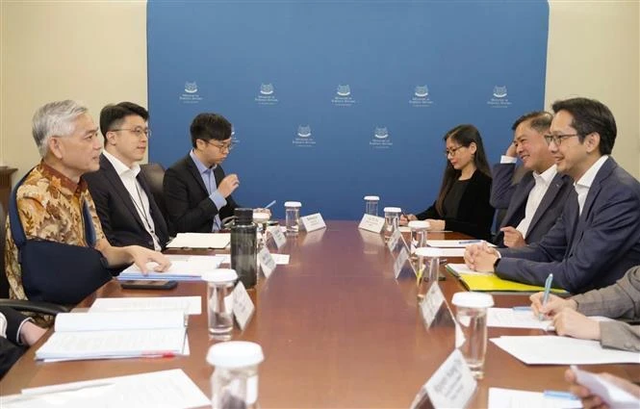Viet Nam, Singapore hold 16th political consultation
VGP - Vietnamese Deputy Minister of Foreign Affairs Do Hung Viet and Permanent Secretary of the Ministry of Foreign Affairs of Singapore Albert Chua co-chaired the 16th Viet Nam-Singapore political consultation in Singapore on September 4.

The 16th Viet Nam-Singapore political consultation was held in the city-state on September 4. Photo: VNA
Both sides agreed that the Viet Nam-Singapore strategic partnership is increasingly robust and effective across all areas, marked by regular high-level delegation exchanges and flourishing relations between the ruling parties.
An annual meeting mechanism established by the two countries' Prime Ministers to review and discuss the overall direction of cooperation during multilateral meetings has further strengthened the sides' bond.
Economic cooperation remains a cornerstone of the bilateral ties, with Singapore being the second largest foreign investor in Viet Nam, running 3,742 projects worth over US$80 billion.
The success of 18 Viet Nam-Singapore Industrial Parks (VSIPs) across 13 Vietnamese cities and provinces has significantly contributed to this economic prowess.
Besides, cooperation in national defence-security, education, culture, and people-to-people exchange has contributed to raising mutual understanding between the two countries' people.
Both sides committed to closely coordinating and effectively implementing agreements made by the two countries' leaders.
They affirmed their commitment to advancing the Digital Economy - Green Economy Partnership and the Connectivity Framework Agreement to achieve breakthroughs in emerging areas such as circular economy, digital transformation, innovation, green energy, and sustainable development.
Deputy Minister Do Hung Viet expressed his wish for more next-generation smart and green VSIPs across Viet Nam, and urged Singapore to continue supporting Viet Nam in improving workforce quality, particularly strategic-level officials.
He also called for more scholarships for Vietnamese students and the training of personnel for the digital transformation process.
For his part, Deputy Minister Albert Chua wished for closer collaboration in emerging sectors such as clean energy, including wind power, and carbon credit exchanges to achieve the goal of net-zero emissions by 2050.
He proposed increasing cooperation in farm produce export-import to ensure food security and boost aviation connectivity to support economic, trade and tourism growth.
On global and regional issues of shared concern, both sides agreed on the importance of sub-regional cooperation in advancing the development of the Association of Southeast Asian Nations (ASEAN) Community and promoting sustainable growth in the region.
They concurred on maintaining consultations and actively working with ASEAN member states in building strategies implementing the ASEAN Community Vision 2045 and further upholding ASEAN's central role in regional matters.
They shared their evaluations and determination to build the East Sea into the sea of peace, cooperation and development, seriously and fully implement the Declaration on the Conduct of Parties in the East Sea (DOC), and work toward an effective and legally binding Code of Conduct in the East Sea (COC) in line with international law and the 1982 UN Convention on the Law of the Sea (UNCLOS).
Deputy Minister Do Hung Viet invited Singapore to attend the ASEAN Future Forum 2025 in Viet Nam to share ideas and initiatives that complement regional cooperation.
On the occasion, he paid a courtesy call on Singaporean Minister for Foreign Affairs Vivian Balakrishnan./.
